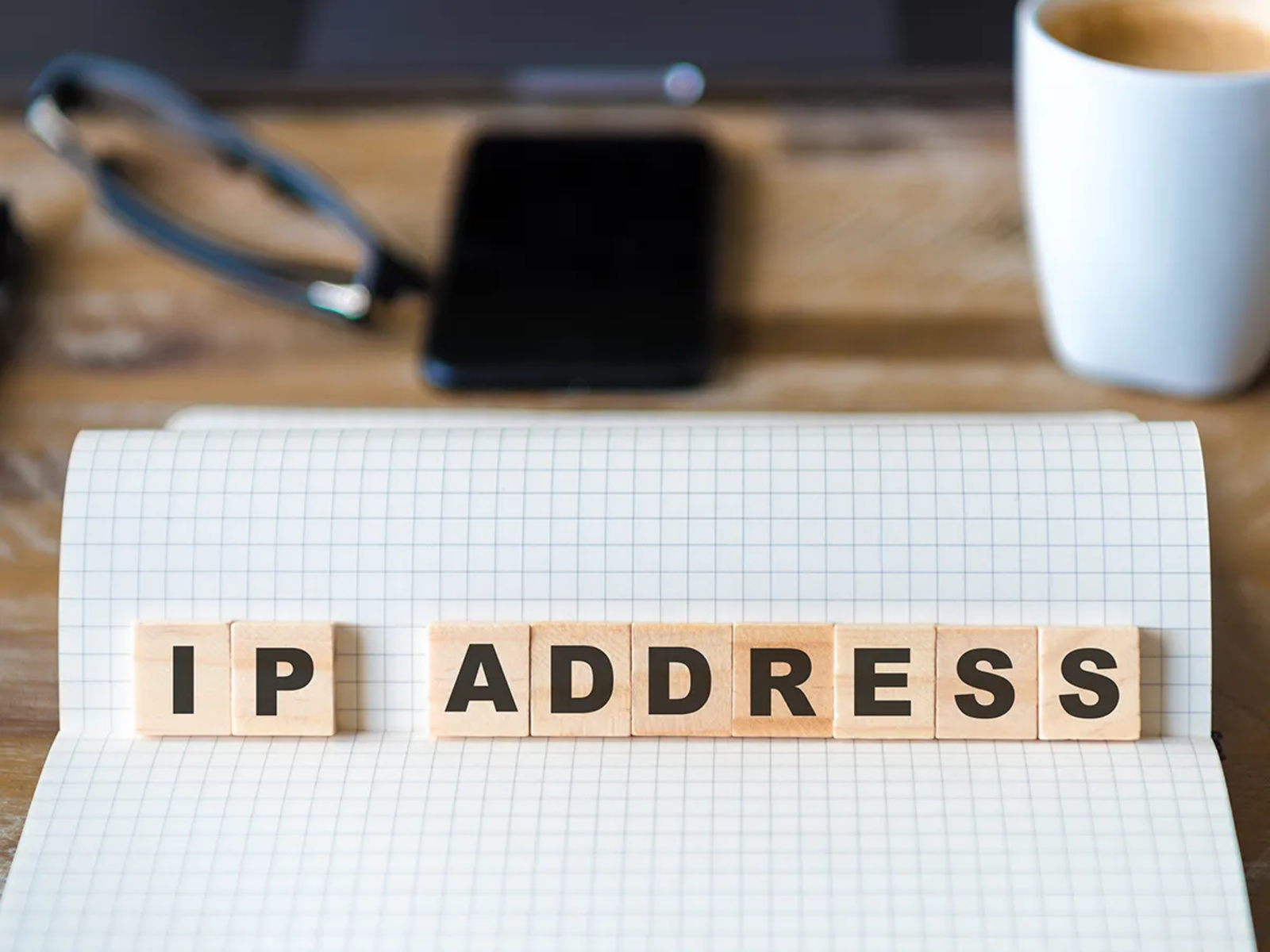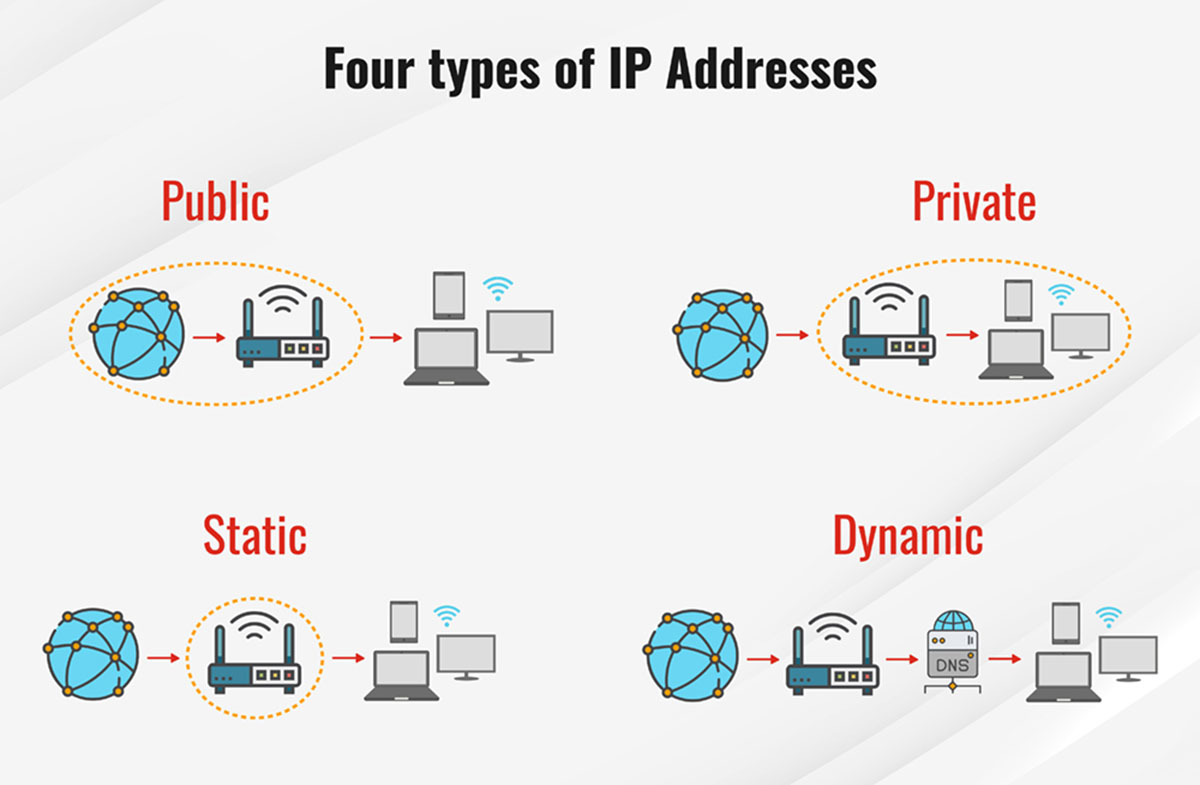Introduction
Welcome to the world of IP addresses, a vital component of our interconnected digital landscape. Whether you’re browsing the web, streaming a video, or checking your email, you rely on IP addresses to establish connections and communicate with other devices. But have you ever wondered who owns these IP addresses? Who is responsible for allocating them and ensuring the smooth operation of the internet?
IP addresses, short for Internet Protocol addresses, serve as unique identifiers for devices connected to a network. They play a crucial role in facilitating the exchange of data packets between different devices and locations. Every time you access a website, send an email, or perform any online activity, your device is assigned an IP address that allows other devices to locate and communicate with it.
So, who is in control of these IP addresses? The answer is not as straightforward as you might think. The ownership and management of IP addresses are distributed among various entities and organizations, each playing a specific role in the global network.
The assignment and administration of IP addresses are overseen by a system that involves Regional Internet Registries (RIRs), Internet Service Providers (ISPs), and individual organizations. The RIRs are responsible for allocating IP address blocks to ISPs, who, in turn, assign them to individuals, businesses, and other organizations based on their connectivity needs.
IP address ownership can be viewed from different perspectives. On one hand, individuals and organizations that receive IP addresses from ISPs may consider themselves as the owners of those addresses. They hold the right to use and manage the addresses as they see fit, as long as they adhere to the terms and conditions set by their ISP.
However, it is important to note that IP address ownership is not absolute. It is more accurate to describe it as a lease or a license. Regional Internet Registries maintain control over the allocation and distribution of IP address blocks, and they reserve the right to reclaim or reassign addresses if necessary. This ensures that IP address resources are managed efficiently and fairly within the global network.
What is an IP address?
At its core, an IP address is a unique numerical label assigned to each device connected to a computer network that uses the Internet Protocol for communication. It serves as a means of identification and location, allowing devices to transmit and receive data over the internet.
IP addresses are composed of a series of numbers separated by dots. There are two main versions of IP addresses: IPv4 and IPv6. IPv4 addresses consist of four sets of numbers ranging from 0 to 255, such as 192.168.0.1. However, due to the exponential growth of internet-connected devices, the supply of available IPv4 addresses has become scarce. As a result, IPv6 was introduced, which utilizes a hexadecimal system and provides a significantly larger pool of addresses.
IP addresses are divided into two distinct parts – the network portion and the host portion. The network portion identifies the specific network to which the device belongs, while the host portion differentiates individual devices within that network. This hierarchical structure allows for efficient routing of data across the internet.
An IP address can be classified into several types, including public and private addresses. Public IP addresses are globally unique and can be accessed from anywhere on the internet. These addresses are assigned to routers and other network devices directly connected to the internet.
On the other hand, private IP addresses are used within local networks, such as home or office networks. They are not accessible from outside the local network and are primarily used for internal communication and address conservation. Private IP addresses are typically assigned by routers using a range prescribed by the Internet Assigned Numbers Authority (IANA).
IP addresses also play a critical role in network security. By logging and tracking IP addresses, network administrators can monitor network activity, identify potential threats, and enforce security measures to protect against unauthorized access. Furthermore, IP addresses are used in geolocation services to determine the approximate physical location of an internet user, which can be useful for delivering localized content or for targeted advertising.
In summary, an IP address is a unique identifier assigned to devices within a network. It enables communication and data exchange across the internet, allowing devices to locate and connect with one another. The evolution and management of IP addresses have become crucial in ensuring the growth and stability of the internet as we know it today.
How are IP addresses assigned?
The assignment of IP addresses follows a well-defined process to ensure efficient allocation within the global network. The responsibility for assigning IP addresses lies with the Regional Internet Registries (RIRs), which are regional organizations responsible for managing and distributing IP address resources.
When an organization or Internet Service Provider (ISP) requires IP addresses, they apply to the appropriate RIR based on their geographical location. The RIR evaluates the request and, if approved, allocates a block of IP addresses to the organization or ISP. This block can vary in size, from a few addresses to a large range that can accommodate thousands of devices.
Once the block is allocated, the organization or ISP can further divide and assign IP addresses to individual devices within their network. This process is often performed by routers or network administrators using network address translation (NAT) techniques. NAT allows multiple devices within a private network to share a single public IP address, conserving address space.
IP addresses can be assigned statically or dynamically. In static addressing, an organization manually assigns a specific IP address to a device and ensures that it remains unchanged over time. This approach is commonly used for devices that require a fixed, known IP address, such as servers or printers.
On the other hand, dynamic addressing involves IP addresses being assigned dynamically by a DHCP (Dynamic Host Configuration Protocol) server. When a device connects to a network, it sends a request to the DHCP server, which then allocates an available IP address from a pool. This approach is often used for devices that connect temporarily or devices in large networks where static addressing would be cumbersome.
It is important to note that the management of IP address assignment is not only the responsibility of RIRs and ISPs. Organizations and individuals also play a role in managing the IP addresses they are allocated. They are responsible for maintaining the integrity of their assigned addresses, ensuring that they are used ethically and efficiently.
In summary, IP addresses are assigned through a hierarchical process that involves RIRs allocating blocks to organizations and ISPs, who then divide and assign them to individual devices within their networks. The assignment can be static or dynamic, depending on the requirements of the devices and the network infrastructure.
Ownership of IP addresses
When it comes to the ownership of IP addresses, it’s important to understand that it is not as straightforward as owning physical property. Instead, IP address ownership can be seen as a lease or a license, as the control and allocation of IP addresses are managed by regional organizations known as Regional Internet Registries (RIRs).
The RIRs are responsible for the allocation and distribution of IP address blocks to Internet Service Providers (ISPs) within their respective regions. The ISPs, in turn, assign IP addresses to organizations and individuals who require them to connect to the internet.
From the perspective of an organization or individual using an assigned IP address, ownership can be perceived as having the right to use and manage the address for their specific needs. They are responsible for configuring their network devices to utilize the assigned IP addresses and ensuring that they are used in accordance with the terms and conditions set by their ISP.
However, the ownership of IP addresses is not absolute. The RIRs maintain control over the allocation and distribution of IP address blocks, and they have the authority to reclaim or reassign addresses if necessary. This is done to ensure the efficient and fair use of IP address resources within the global network.
Another factor that influences IP address ownership is the concept of transferability. In some cases, organizations or individuals may have the opportunity to transfer their IP addresses to another party. This transfer typically requires following specific procedures and obtaining approval from the RIR and ISPs involved.
It’s important to note that IP address ownership is different from domain name ownership. Unlike IP addresses, domain names can be registered and owned by individuals or organizations who have the exclusive right to use and manage them.
Overall, while organizations and individuals may have the perception of ownership over their assigned IP addresses, the ultimate control and authority lie with the RIRs. This ensures that IP addresses are allocated and managed fairly and efficiently within the global network.
Regional Internet Registries (RIRs)
Regional Internet Registries (RIRs) are regional organizations responsible for the allocation and management of IP address resources within their respective geographical regions. There are five RIRs across the world, each serving a specific region: Africa, Asia-Pacific, North America, Latin America and the Caribbean, and Europe, the Middle East, and Central Asia.
The primary role of RIRs is to ensure the fair and efficient distribution of IP addresses to Internet Service Providers (ISPs), who can then assign the addresses to organizations and individuals in their respective regions. RIRs are responsible for managing large blocks of IP addresses known as address space.
One of the key functions of RIRs is to develop and implement policies related to the allocation and utilization of IP addresses. These policies are intended to ensure that IP address resources are distributed in a manner that promotes responsible and sustainable growth of the internet.
RIRs maintain a registry of IP address allocations and assignments, providing a publicly accessible database that allows for the verification and tracking of address usage. This helps prevent overlaps or conflicts in IP address assignments and aids in the identification of resource utilization patterns.
Furthermore, RIRs play a crucial role in facilitating the coordination and cooperation among ISPs within their regions. They provide a platform for ISPs to collaborate, share technical expertise, and engage in discussions regarding the management and allocation of IP address resources.
In addition to managing IP address allocation, RIRs also contribute to the development and deployment of new internet protocols and technologies. They actively participate in global forums and policy-making processes to shape the future of internet governance and ensure the smooth functioning of the global network.
Each RIR has its own governance structure, which involves a membership-based system with representation from ISPs, organizations, and individuals within their respective regions. The policies and decisions of RIRs are made through a transparent and inclusive process, allowing stakeholders to actively participate and contribute to the management of IP address resources.
In summary, Regional Internet Registries (RIRs) play a crucial role in the allocation, management, and coordination of IP address resources within their respective regions. Through the development of policies, maintenance of registries, and fostering of collaboration among ISPs, RIRs ensure the responsible and efficient use of IP addresses, contributing to the growth and stability of the internet as a global network.
Internet Service Providers (ISPs)
Internet Service Providers (ISPs) play a critical role in the allocation and management of IP addresses. They act as intermediaries between Regional Internet Registries (RIRs) and end-users, facilitating the distribution of IP addresses to individuals, organizations, and other entities.
ISPs are responsible for connecting end-users to the internet by providing the necessary infrastructure and services. They acquire IP address blocks from RIRs, which they then assign and allocate to their customers. The size and range of IP address blocks allocated to ISPs depend on factors such as the number of subscribers and the geographical coverage of their network.
One of the important functions of ISPs is to assign IP addresses to individual devices or networks within their customer base. This is done through techniques such as network address translation (NAT), which allows multiple devices to share a single public IP address. ISPs implement policies and procedures to manage IP address assignments, ensuring efficient and effective utilization of the IP address resources they are allocated.
ISPs also play a vital role in managing IP address infrastructure. They are responsible for maintaining and operating the network infrastructure that routes data packets to and from their customers’ devices. This includes managing routers, switches, and other networking equipment to ensure seamless connectivity and efficient data transmission.
In addition to IP address allocation and network infrastructure management, ISPs also provide a range of other services to their customers. These services may include internet connectivity, email services, web hosting, virtual private networks (VPNs), and more. ISPs are tasked with ensuring the reliability, security, and quality of these services, as well as complying with relevant regulations and privacy requirements.
ISPs often have their own terms and conditions, which govern the use of IP addresses and the services provided. Customers are required to adhere to these terms, which may include restrictions on activities such as spamming, hacking, or engaging in illegal activities over the network. ISPs have the right to revoke or suspend IP addresses if customers violate these terms, ensuring the integrity and security of their network and IP address resources.
Overall, ISPs serve as the bridge between RIRs and end-users, facilitating the allocation and distribution of IP addresses. They play a crucial role in managing network infrastructure, assigning IP addresses to customers, and providing internet services. Through their operations and services, ISPs contribute to the accessibility and connectivity of the internet for individuals and organizations worldwide.
Individuals and organizations
Individuals and organizations make up the end-users of IP addresses and play a significant role in the utilization and management of these resources. They are the entities that receive IP addresses from Internet Service Providers (ISPs) and are responsible for configuring and maintaining their network devices.
For individuals, IP addresses are typically assigned by ISPs when they connect to the internet via their home networks or mobile devices. These addresses allow individuals to access online services, browse websites, and communicate with others. Individuals may also lease or purchase additional IP addresses for specific purposes, such as hosting a personal website or running a home server.
Organizations, on the other hand, rely on IP addresses to connect their devices, servers, and other network infrastructure to the internet. Businesses, educational institutions, government entities, and non-profit organizations all require IP addresses to enable their online operations. These addresses allow organizations to establish their web presence, deliver services, communicate with clients and partners, and enable remote access to their systems.
Individuals and organizations have the freedom to configure their network devices and systems to utilize the assigned IP addresses. They are responsible for managing their IP address resources efficiently and ethically, ensuring that they are used for legitimate purposes and in compliance with applicable laws and regulations.
Managing IP addresses involves tasks such as configuring routers, assigning IP addresses to devices, and maintaining accurate documentation of address usage. Proper IP address management helps prevent conflicts, ensures efficient network routing, and allows for the traceability of network activity.
Furthermore, individuals and organizations are responsible for implementing security measures to protect their IP addresses and network infrastructure. This involves ensuring the appropriate firewall configurations, utilizing encryption protocols, and regularly updating software and firmware to address vulnerabilities.
Organizations may also need to obtain additional IP addresses as their needs grow. This can be achieved through their ISP or by applying to the regional Internet registry for more address space. The acquisition of additional IP addresses may require justification, such as demonstrating the need for expansion or new services.
In summary, individuals and organizations are the end-users of IP addresses, receiving them from ISPs to connect to the internet and enable their online activities. They are responsible for configuring and managing their network devices, ensuring the secure and efficient utilization of their assigned IP address resources.
IP address leasing and allocation
In the world of IP addresses, two common approaches to obtaining these resources are through leasing and allocation. These methods allow individuals, organizations, and Internet Service Providers (ISPs) to obtain the IP addresses they need to connect to the internet and facilitate communication.
Leasing IP addresses involves individuals or organizations obtaining temporary usage rights for a specific range of addresses. This leasing arrangement is typically facilitated by an ISP, which assigns the leased IP addresses to the lessee for a defined period. The lessee pays a fee to the ISP for the duration of the lease, similar to renting a property. IP address leasing is especially beneficial for individuals or organizations with short-term or evolving connectivity needs and provides flexibility in managing their network infrastructure.
On the other hand, IP address allocation refers to the process of permanently assigning or distributing IP addresses to individuals, organizations, or ISPs. This allocation is typically managed by Regional Internet Registries (RIRs), which oversee IP address resources within their respective geographic regions. RIRs allocate IP address blocks to ISPs, who can then further assign or allocate smaller portions of those blocks to their customers.
IP address allocation and assignment follow a hierarchical structure. RIRs manage large blocks of IP address space and allocate them to ISPs based on the size and requirements of their networks. ISPs, in turn, divide the allocated address space into smaller subnets and assign them to their customers, which can be individuals or organizations. This hierarchical approach allows for efficient routing and scalability of the internet.
Both leasing and allocation of IP addresses come with certain responsibilities and requirements. Lessees and entities obtaining allocated IP addresses must adhere to the terms and conditions set by the ISPs and RIRs, respectively. This includes using the IP addresses for legitimate purposes, not engaging in illegal activities, and complying with relevant regulations and policies. Failure to comply with these requirements may result in the revocation or reassignment of the IP addresses.
Additionally, organizations and individuals have a role in managing the IP addresses they lease or are allocated. They are responsible for configuring their network devices, documenting IP address usage, and ensuring the efficient utilization of their assigned addresses. Proper IP address management helps prevent conflicts, enables efficient routing, and allows for accurate tracking of network activity.
In summary, IP address leasing and allocation are two methods through which individuals, organizations, and ISPs obtain the IP addresses they need. Leasing provides temporary usage rights, often facilitated by ISPs, while allocation involves the permanent assignment or distribution of IP addresses, overseen by RIRs. Both approaches come with responsibilities and requirements to ensure the proper and responsible use of IP address resources.
Who owns IP addresses in different regions?
The ownership of IP addresses varies depending on the region and the specific allocation and assignment processes implemented by the respective Regional Internet Registries (RIRs). While individuals and organizations may perceive themselves as the owners of the IP addresses they are assigned, the ultimate control and authority lie with the RIRs.
In North America, the American Registry for Internet Numbers (ARIN) is the RIR responsible for managing IP address resources. ARIN allocates IP address blocks to Internet Service Providers (ISPs) operating in the region. ISPs, in turn, assign or allocate smaller portions of these blocks to their customers, such as organizations or individuals. While the customers may have usage rights and control over the assigned addresses, ARIN maintains control over the allocation and distribution of IP addresses in the region.
In Europe, the Middle East, and Central Asia, the RIPE Network Coordination Centre (RIPE NCC) serves as the RIR. Similar to ARIN, RIPE NCC allocates IP address blocks to ISPs in the region, who then assign or allocate them to end-users. The ownership perception rests with the customers, but RIPE NCC retains the authority over the allocation and distribution of IP addresses within its region.
The Asia-Pacific region is covered by the Asia-Pacific Network Information Centre (APNIC), which handles the allocation of IP addresses. APNIC allocates IP address blocks to ISPs, who are responsible for further assignment or allocation to end-users. While organizations and individuals may consider themselves the owners of the assigned addresses, APNIC holds the ultimate control and authority over IP address resources in the region.
In the African region, the regional RIR is the African Network Information Centre (AFRINIC). AFRINIC manages IP address allocations and assignments to ISPs operating in the region. ISPs then distribute IP addresses to their customers. The perception of ownership rests with the customers, but AFRINIC retains the authority and control over IP address resources within its service area.
Lastly, in Latin America and the Caribbean, the regional RIR is the Latin America and Caribbean Network Information Centre (LACNIC). LACNIC is responsible for allocating IP address blocks to ISPs in the region, who are then responsible for further distribution to their customers. Similar to other regions, while individuals and organizations may perceive themselves as the owners of the assigned IP addresses, LACNIC maintains the control and authority over IP address resources.
It’s important to note that the ownership of IP addresses is not absolute in any region. RIRs maintain control over the allocation and distribution of IP address resources and can reclaim or reassign addresses if necessary. The allocation and assignment processes ensure the efficient and fair use of IP address resources within the global network.
The role of governments in IP address ownership
Governments play a significant role in the oversight and regulation of IP address ownership. While ownership of IP addresses primarily lies with organizations, individuals, and Regional Internet Registries (RIRs), governments contribute to the overall management of IP address resources and ensure compliance with relevant laws and regulations.
One of the key roles of governments is to establish policies and regulations regarding IP address allocation and usage. They work in collaboration with RIRs and other regional entities to develop frameworks that promote the responsible and efficient management of IP addresses within their jurisdictions.
Government bodies often work closely with RIRs to ensure that IP addresses are allocated and assigned transparently and in accordance with national regulations. They may provide guidance on matters such as address space utilization, IP address security, and policies for the allocation of IP addresses to government agencies or critical infrastructure providers.
In some cases, governments may have a direct role in IP address allocation and management. They may establish national registries, operated in coordination with the RIRs, to oversee the assignment of IP addresses within their countries. These national registries work closely with RIRs to ensure that IP address allocations align with national interests, policies, and regulations.
Another crucial aspect of government involvement in IP address ownership is the enforcement of intellectual property rights. Governments often have legislation in place to protect copyrights, trademarks, patents, and other intellectual property. This includes addressing issues such as online piracy and infringement, where IP addresses can be used to track and identify individuals or organizations involved in copyright violations.
Governments also play a role in addressing cybersecurity concerns related to IP address ownership. They establish laws and regulations to combat cybercrime, protect data privacy, and ensure the security of critical infrastructure. Government agencies collaborate with RIRs, ISPs, and other stakeholders to develop and implement strategies to address cyber threats and mitigate potential risks associated with IP addresses.
Additionally, governments may intervene in cases where IP address resources are misused or involved in illegal activities. They have the authority to investigate and take action against individuals or organizations who engage in activities such as hacking, spamming, or distributing malicious content. These actions contribute to maintaining a safe and secure online environment for all users.
In summary, governments play an important role in IP address ownership by establishing policies, regulations, and frameworks to ensure the responsible and efficient allocation and usage of IP addresses within their jurisdictions. They work in collaboration with RIRs, enforce intellectual property rights, address cybersecurity concerns, and take action against illicit activities involving IP addresses.
Challenges in IP address ownership
While IP address ownership is a fundamental aspect of internet connectivity, it comes with its own set of challenges. These challenges arise from the dynamic nature of the internet, the limited supply of IPv4 addresses, and the complexity of managing IP address resources within a global network.
One of the primary challenges is the depletion of available IPv4 addresses. IPv4, the most widely used version of IP addresses, has a limited pool of addresses due to its 32-bit structure. The exponential growth of internet-connected devices has significantly reduced the availability of IPv4 addresses, leading to the adoption of IPv6, which provides a larger pool of addresses. However, the transition from IPv4 to IPv6 poses technical and logistical challenges, as it requires updates to network infrastructure and widespread adoption across devices and networks.
Another challenge is the uneven distribution of IP address resources across different regions. Some regions have a higher concentration of allocated addresses, while others face scarcity. This can lead to disparities in connectivity and hinder the growth of internet usage and innovation in certain areas. Efforts are being made to address this challenge by optimizing the allocation process and promoting policies that encourage equitable distribution of IP addresses.
The increasing demand for IP addresses also poses challenges in managing and planning for future address space needs. With the proliferation of Internet of Things (IoT) devices, mobile devices, and emerging technologies, the demand for IP addresses continues to grow. This requires careful resource management, allocation, and efficient utilization of available address space to ensure its sustainability.
Additionally, the transferability of IP addresses can present challenges. While IP addresses were traditionally viewed as non-transferable, the advent of marketplaces and trade in IP addresses has created a new landscape. The transfer of IP addresses introduces complexities in tracking, verifying, and maintaining the integrity of ownership. Policies and procedures surrounding IP address transfers are continuously evolving to address these challenges and ensure transparency and accountability.
The issue of IP address hijacking and unauthorized usage poses a significant challenge to IP address ownership. Cybercriminals may attempt to hijack IP addresses for malicious activities, such as spreading malware or launching distributed denial-of-service (DDoS) attacks. This highlights the importance of robust security measures, including authentication mechanisms and network monitoring, to protect IP address resources and prevent unauthorized usage.
Lastly, the complexity of managing IP address ownership within a global network with multiple stakeholders can pose administrative challenges. Coordinating efforts between Regional Internet Registries (RIRs), Internet Service Providers (ISPs), organizations, governments, and individuals requires effective communication, standardized processes, and adherence to policies and regulations.
In summary, challenges in IP address ownership arise from the limited supply of IPv4 addresses, the uneven distribution of resources, the growing demand for addresses, transferability complexities, issues with hijacking, and the intricacies of managing ownership within a global network. Addressing these challenges requires continuous collaboration, technological advancements, and sustainable resource management to ensure the stability and efficient operation of the internet.
Conclusion
IP address ownership is a complex and dynamic aspect of the internet ecosystem. While individuals and organizations may perceive themselves as the owners of assigned IP addresses, the ultimate control and authority lie with the Regional Internet Registries (RIRs). RIRs play a crucial role in the allocation and management of IP address resources, ensuring their fair and efficient distribution within different regions.
Internet Service Providers (ISPs) act as intermediaries, assigning and allocating IP addresses to their customers based on the resources allocated to them by the RIRs. Individuals and organizations configure their network devices and manage their IP addresses to facilitate their digital connectivity and online activities.
The challenges in IP address ownership, such as the depletion of IPv4 addresses, uneven distribution, and the growing demand for addresses, require ongoing collaboration and resource management. Efforts are being made to address these challenges through the adoption of IPv6, equitable allocation practices, and the implementation of address transfer policies.
Governments also play an important role in IP address ownership by establishing regulations, protecting intellectual property rights, addressing cybersecurity concerns, and ensuring compliance with national laws.
In conclusion, IP address ownership is a shared responsibility among RIRs, ISPs, individuals, organizations, and governments. Through collaborative efforts, efficient resource management, and adherence to policies and regulations, the internet can continue to thrive and evolve, connecting individuals, organizations, and devices across the globe.

























